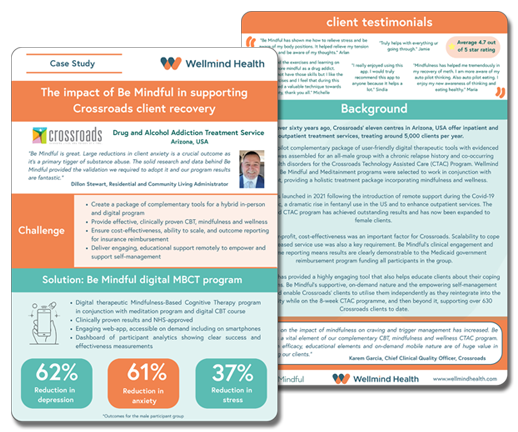The CLIENT 
Stillwater Public Library, Oklahoma
Main contact: Stacy DeLano, Library Director
Challenge 
Identify a solution that can effectively support wellbeing of community members
Reduce stress and anxiety
Offer a credible, high-quality program that enables anytime access
Provide a solution that minimises staff administration time and effort
Solution 
Digital Mindfulness-Based Cognitive Therapy programme, made available via website
Clinically proven and approved by UK’s NHS
Accessible and on demand web-app, compatible with all devices
Dashboard including anonymised analytics showing clear success and effectiveness measurements
Outcomes 
Course completers recorded very high, clinically validated results:
53% reduction in depression
44% reduction in anxiety
31% reduction in stress
Improved access to mental health support
4.7-star average user rating
Participant Feedback
Susan
Participant Testimonial
Robin
Participant Testimonial
Jessica
Participant Testimonial
Summary
In Feb 2021, Stillwater Public Library launched the self-paced, four-week Be Mindful course as part of the library's stress-reduction health literacy efforts - made possible through a grant from the Oklahoma Department of Libraries and the Institute of Museum and Library Services.
Recognising the needs of its members, the library had sought to establish a wellbeing initiative for some time and, with a grant available, realised that digital channels could provide an easy way to extend their services and support mental health in the community.
Several different online programs were considered but many patrons were now tired of live, online classes. A self-paced, digital program became a primary consideration - especially one that would not demand a lot of staff contact.
The library soon discovered Be Mindful and recognised that this program is one of very few that met the stringent standards of the UK's National Health Service (NHS). The program was set up very quickly and was then opened to members who could register on the library's webpage.
There were some important learnings from the rollout. Ultimately, participants themselves must take responsibility for their mental health and there was a lower follow-through from those who had not realised that active engagement would be required. Additionally, it was recognised that when services are provided free of charge, those who signed-up may not have been so committed to activating or completing the course.
Every lesson viewed can be life-enhancing and for those who followed the course through to completion, the statistical results have been extremely positive.


